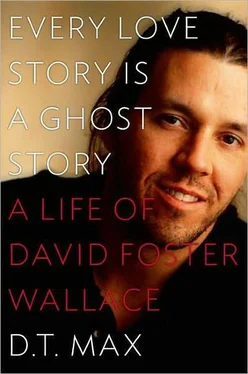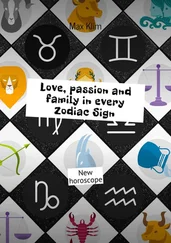Professionally Wallace was in a holding pattern combined with a juggling act. He was waiting for the Norton publication of Girl with Curious Hair in August and the start of graduate school a month later. Most of his time was taken up with nonfiction pieces, one a review of David Markson’s Wittgenstein’s Mistress , a book he’d bought because he found the advertisement in the Review of Contemporary Fiction irresistible. “I may well be,” he acknowledged to Moore, “the world’s most kindly predisposed reader” of the novel.
But he found out the hard way that not everyone admired the book as much as he. Downstairs from Wallace and Costello was a freelance intellectual and part-time furniture mover, who called himself “the World’s #1 David Foster Wallace fan.” “Not that Broom of the System isn’t a piece of shit, mind you,” he would tell Wallace. “It’s just less of a piece of shit than anything else being published.” Wallace was drawn to this “failed english grad student,” as he called him in a letter to Moore. The two would watch police shows — the mover called such viewing “monitoring the popular culture,” a congenial phrase for Wallace. The mover’s girlfriend was a beautiful heiress from Texas, whom he had nicknamed “the Lizard.” Wallace began a relationship with the young woman, and he and her boyfriend wound up fighting — though not over the Lizard. It was over Markson’s novel, which Wallace had recommended to him.
Thinking and writing about the novel was an enormous gift and time-snare to Wallace. The book narrates the thoughts of Kate, a woman who is either the last person on earth or else deluded that she is. The novel dramatizes the Wittgensteinian stance that the world is nothing but observed facts, a proposition that leads, as Wallace would write in “The Empty Plenum,” his essay on the book, to the belief that “one’s head is, in some sense, the whole world.” Kate’s affectless thoughts thus could be a record of Wallace’s mind at its most depressed:
There is nobody at the window in the painting of the house, by the way.
I have now concluded that what I believed to be a person is a shadow.
If it is not a shadow, it is perhaps a curtain.
As a matter of fact it could actually be nothing more than an attempt to imply depths, within the room.
Although in a manner of speaking all that is really in the window is burnt sienna pigment. And some yellow ochre.
In fact there is no window either, in that same manner of speaking, but only shape.
So that any few speculations I may have made about the person at the window would therefore now appear to be rendered meaningless, obviously.
Unless of course I subsequently become convinced that there is somebody at the window all over again.
This was not a book that spoke to most readers — Kate does not, cannot, find a way out of her prison, and the book ends where it begins, with her isolation — but it spoke to Wallace. His downstairs friend was not convinced. He felt that Markson’s novel was finally conventional and found Kate’s voice “inauthentic.” Wallace, having written a novel from a woman’s point of view, considered himself the authority here. In any event, he loved the book — in his essay he would declare it “one of the U.S. decade’s best”—and wasn’t going to see anyone tap-dance in cleats on it. The dispute turned into a fight — at least according to an account Wallace wrote Moore. His downstairs neighbor swung, Wallace swung back, the mover swung a second time and broke Wallace’s nose—“the exact part of my nose that was already x’rayed and covered with a useless bandage” from a basketball injury, Wallace wrote with pride in a letter to his editor. 20
Wallace’s other big project was a long piece on rap music. In Somerville, Psychotic Reactions and Carburetor Dung , by the late rock critic Lester Bangs, was required reading. Wallace admired Bangs’s exultant prose, which probably came closer to the way Wallace talked than any other writing. Bangs’s phrase “an erection of the heart” became one of Wallace’s favorites, leading to the definition of great fiction in his essay on Wittgenstein’s Mistress as “making heads throb heartlike.” 21Greil Marcus’s Mystery Train was another book the roommates handed back and forth, in part an exploration of Elvis Presley’s musical roots. Bangs and Marcus had found their subject in the music of earlier eras, but Wallace became increasingly interested in whether a parallel effort might be able to extract some larger meaning from current popular music. Early in the spring, a slacker friend of Costello’s from New York brought up a cassette of It Takes a Nation of Millions to Hold Us Back by Public Enemy, and the roommates were intrigued. Rap was just entering the mainstream, a mixture of verbal innovation and societal defiance. N.W.A.’s Straight Outta Compton had just come out, and Tone Lōc’s “Funky Cold Medina” was one of the fastest-selling singles ever. Rap was on its way to becoming gangsta rap, nihilism replacing hedonism, but at the moment the claims that could be made for it as serious art were enticing. One night, at a diner near their house, the two young men took stock of the situation. They read, as Costello remembers, in the Boston Globe that cars were being stopped just for playing N.W.A.’s “Fuck tha Police.” Wallace admired the energy in rap, its careless creativity while he felt so burdened. He found the way the singers played with their own fame in their lyrics intriguingly postmodernist. There was also the irony to be explored that rap musicians were able to lift from others without fear to create their own art, just the transgression for which Viking Penguin had punished him.
Wallace’s passion for rap was theoretical, verbal, abstract. The music never touched him as did the stoner songs of high school or the moody tripping songs of Amherst. His interest had the quality of a very smart kid slumming it. But he was drawn to its defiance, its opposition to the authority and decorum by which he had lived his difficult life. There was an element of self-hatred to his stance. If his world had collapsed, let art collapse with it. One day the two young men went to a concert of Slick Rick and Gang Starr at a Roxbury high school, but the sound system failed and the gym grew hot. Wallace, as often happened at concerts, had an attack of claustrophobia, and Costello drove him home.
Wallace no longer felt he was writing well — the lift post — shock therapy had dissipated — and even nonfiction was bringing problems. He was, remembers Costello, writing seventy-five-word sentences, all the information in his head pouring out at once. “No one writes nonfiction like this,” he told his roommate. Sometimes he would write twenty-five thousand words in a day, Costello remembers, then cut them the next. Wallace’s relationship with the page was now so confused and volatile that he felt he needed a collaborator to face what in his Wittgenstein’s Mistress review he calls “typing paper’s blankness.” He began to leave the portions he’d drafted for Costello to comment on when he got home. Soon the roommates were alternating writing sections of the essay, Wallace by day, Costello by night. (“Chess by mail,” is how Costello describes the collaboration.) Wallace’s gesture to include his roommate was at once generous — he knew Costello still held literary aspirations — and defensive, even desperate. 22He lived on Pop-Tarts and cigarettes and listened to Brian Eno’s “The Big Ship” over and over. When Gale Walden came by, he told her he was in bad shape and she should stay away.
Still he had escaped the Wallace Fund for Aimless Children and was having at least the semblance of a good time. He invited Bonnie Nadell to come and visit in June. “Boston is fun ,” he wrote her. “We’ll have laughs, listen to rap and James Brown.” Whatever warnings he had gotten in his Arizona recovery group if he returned to substances, as drugs and alcohol were called, had not come to pass — at least not yet. He would get high or drunk most nights and, as he later told an interviewer, “fuck strangers.” Another nonconformist industry now caught his eye: the pornography business. Pornography fit well into Wallace’s ongoing areas of inquiry: it linked to advertising — the thing really being sold was the idea that we are all entitled to sexual pleasure, which in turn feeds the secondhand desire that Wallace saw at the root of the American malaise, our lives lived, he wrote in his Wittgenstein’s Mistress essay, in “an Information Age where received image & enforced eros replace active countenance or sacral mystery as ends, value, meaning. Etc.”
Читать дальше












